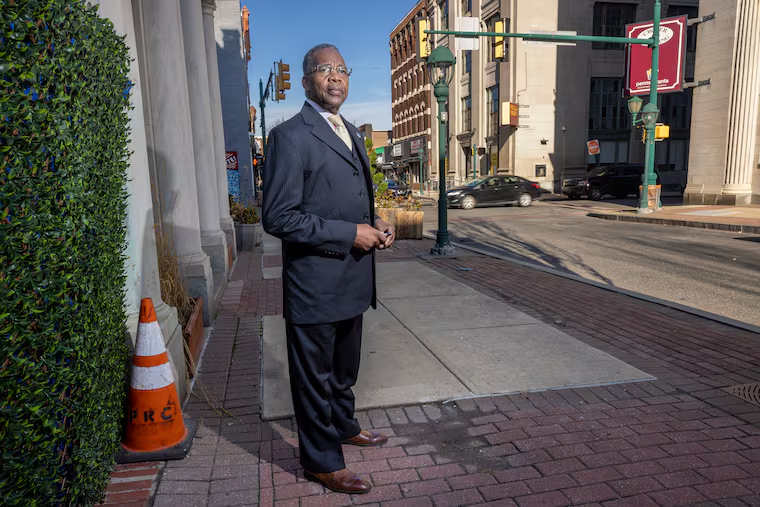A judge approves Chester’s bankruptcy despite protests from city officials and a major creditor
In the rare case, the judge found that the receiver acted properly and that the city had negotiated "in good faith" with a big bondholder.

Over the objections of the city government and a major bondholder, a federal judge has ruled that the state acted properly in taking the economically distressed Chester into a rare municipal bankruptcy.
The decision by U.S. Bankruptcy Court Judge Ashely M. Chan in what has become at times a bitterly contentious process represented a significant legal victory for state receiver Michael Doweary, appointed in 2020 to oversee the city’s troubled finances.
Mayor Thaddeus Kirkland — whose acrimonious relationship with Doweary became a subject of state court hearings in January — and city officials had contended that the receiver overstepped his authority in November when he filed for bankruptcy on behalf of the city. They said it was “flawed interpretation” of state law.
» READ MORE: Chester's bankruptcy was 70 years in the making
In her ruling on Tuesday, however, Chan wrote that “elected officials’ power to govern and make decisions for the city ... is not an absolute power.”
Kirkland on Friday deferred comment. Of the decision, he said, “I haven’t read it yet. I’ve been kind of tied up with some other stuff.”
As for the issues with the bondholder, Preston Hollow Capital Management, Chan said the city had “negotiated in good faith” in reaching a payment agreement.
She also noted that Chester was in “good faith” negotiations over debt-service payments on a $30 million bond issue by Delaware County for the Subaru Park soccer stadium in the city’s West End in 2010.
At the time the stadium was viewed as “a catalyst” for economic development, the judge noted, but that hasn’t happened.
In September, the city’s projected deficit for 2023 was $46.5 million, representing about 80% of the city’s budget, with a total of $16 million in deficits expected in the following two years.
The driving force has been an ever-worsening pension crisis as the city has failed to meet its funding obligations. Chan said it would have been impractical for the receiver to negotiate with individual retirees who were not represented by unions when the bankruptcy petition was filed.
But the city’s money troubles have been decades in the making, the judge noted, and Kirkland’s administration argues that it inherited problems that had been festering during the 20 years of state oversight that preceded his taking office.
As with other postindustrial cities, Chester’s decline had to do with the loss of manufacturing jobs, population decline, crime, and a diminished tax base exacerbated by its high poverty rate. At 3.75%, its resident wage tax is the second-highest in the state, behind only Philadelphia.
These days, payments from Philadelphia Harrah’s Casino and the trash incinerator constitute about a quarter of the city’s annual revenues.
In 2020, at the height of the COVID-19 pandemic, then-Gov. Tom Wolf placed Chester in receivership and appointed Doweary.
» READ MORE: Chester filed for bankruptcy in November.
At first, relations between the receiver’s office and the city were cordial, said Vijay Kapoor, Doweary’s chief of staff. However, they have deteriorated badly. The receiver was barred from City Hall and set up shop in a nearly empty building across the street.
Although the receiver’s office said it was not the precipitating incident, after the city’s finance officer, a member of council, lost $400,000 in a phishing scam, Doweary filed the bankruptcy petition in November. Chester became only the 31st of 38,000 municipalities nationwide to enter bankruptcy.
During a related Commonwealth Court hearing in January, Doweary testified that the mayor had called him the “N-word.” Kirkland acknowledged the racial slur in his testimony and said that at a subsequent meeting he “apologized for my words and actions.”
» READ MORE: Judge calls Chester government "dysfunctional"
In that case, Commonwealth Court Judge Ellen Ceisler issued a sharply worded 45-page ruling in which she said the administration is “internally dysfunctional” and rife with “widespread nepotism.”
She called for “major changes” in the way the city is governed.
Ceisler described “a pattern of city officials’ taking care of their own and intentionally turning their backs on wrongdoing within their departments.”
While she declined to give Doweary complete control of the government, she limited the powers of City Council members by stripping them of their department-head duties, including oversight of the city’s finances.
» READ MORE: The city lost $400,000 in a phishing scam